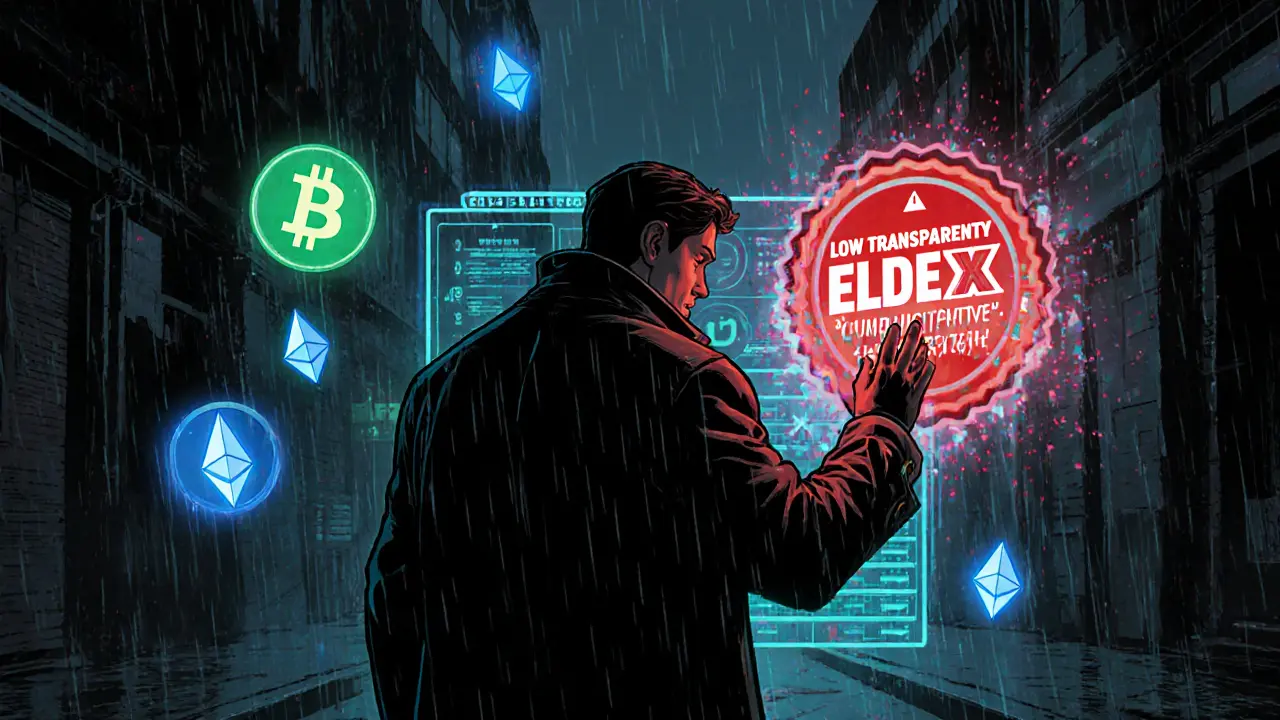ELDEX Crypto Exchange Review 2025: What You Need to Know
A thorough 2025 ELDEX crypto exchange review that examines transparency, security, fees, and compares it with top DEXs like Uniswap and dYdX.
When you hear about ELDEX, a blockchain token focused on decentralized finance services, the first question is often "how safe is it?" It’s a valid concern because crypto assets can be exposed to fraud, hacks, and regulatory crackdowns. Understanding the risks and the tools that help manage them is the first step toward confidence.
One core pillar of ELDEX safety is KYC compliance, the process of verifying user identities to prevent money‑laundering and fraud. When a platform enforces strong KYC, it filters out bad actors, lowers the chance of illicit activity, and builds trust among investors. Think of it as a digital ID check that adds a layer of accountability before anyone can interact with your token.
Another critical element is crypto exchange security, the set of technical and procedural safeguards that protect user funds on trading platforms. Whether you trade ELDEX on a centralized exchange or a decentralized DEX, the security protocols—cold storage, multi‑factor authentication, regular audits—directly affect the safety of your holdings. A breach at an exchange can instantly jeopardize thousands of tokens.
Regulatory oversight also shapes ELDEX safety. For instance, Japan’s Financial Services Agency (FSA) enforces strict crypto rules that force exchanges to maintain transparent operations and robust compliance frameworks. When a jurisdiction imposes clear guidelines, projects like ELDEX benefit from a more stable environment, reducing the likelihood of sudden bans or legal entanglements. In short, strong oversight keeps the playing field fair.
Combining the three pillars—KYC compliance, exchange security, and regulatory oversight—creates a safety net. A practical way to visualize this is a semantic triple: "ELDEX safety encompasses KYC compliance," "Regulatory oversight influences ELDEX security," and "Crypto exchange security reduces ELDEX risk."
Beyond the big three, you’ll also encounter airdrop safety. Free token giveaways can be tempting, but scammers often mimic legitimate projects. Verifying the source, checking official channels, and using a separate wallet for airdrop claims can keep your main holdings safe. While ELDEX may not have an active airdrop right now, the same diligence applies to any future distribution.
Let’s break down the steps you can take right now. First, always confirm that any platform handling ELDEX enforces KYC. Look for clear identity verification procedures and read user reviews about how the platform handles data. Second, assess exchange security: does the platform offer hardware wallet integration? Is there a bug bounty program? Third, stay informed about regulatory news in the regions where you trade. Sudden policy shifts can affect token liquidity and exchange access.
Practical tools can make this easier. For KYC, services like Jumio or Onfido provide automated identity checks that speed up onboarding while maintaining high security standards. For exchange security, hardware wallets like Ledger or Trezor keep your private keys offline, virtually eliminating remote hacking vectors. And for regulatory updates, follow trusted news outlets or subscribe to newsletters that summarize global crypto policy changes.
Even with all safeguards, never underestimate the human factor. Phishing attacks remain a top threat. Always double‑check URLs, avoid clicking unknown links, and use unique passwords for each service. Enabling hardware‑based two‑factor authentication (like YubiKey) adds an extra wall between attackers and your accounts.
Another scenario to watch is flash loan arbitrage, a rapid borrowing technique that can manipulate token prices. While it offers profit opportunities, it also opens the door for price‑impact attacks on low‑liquidity tokens like ELDEX. Monitoring transaction feeds and setting slippage limits on trades can mitigate exposure.
If you’re a developer or a token holder planning to participate in governance, consider the token’s governance model. Transparent voting mechanisms, often powered by blockchain voting, reduce the risk of centralization and manipulation. Efficient governance adds to the overall safety of the ecosystem surrounding ELDEX.
Finally, remember that safety is an ongoing process, not a one‑time checklist. Regularly review your wallet’s security settings, stay current with exchange announcements, and periodically re‑evaluate the regulatory landscape. By treating safety as a habit, you’ll keep ELDEX and your broader crypto portfolio resilient against emerging threats.
Now that you’ve got a roadmap for protecting ELDEX, the articles below dive deeper into each of these topics. From detailed KYC compliance guides to exchange security reviews and regulatory analysis, you’ll find the insights you need to make informed, secure decisions about your ELDEX holdings.

A thorough 2025 ELDEX crypto exchange review that examines transparency, security, fees, and compares it with top DEXs like Uniswap and dYdX.